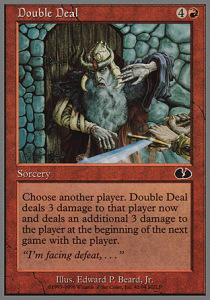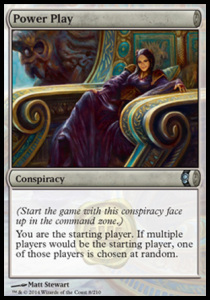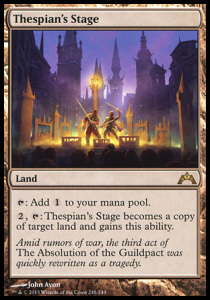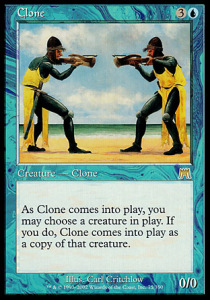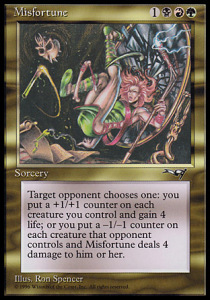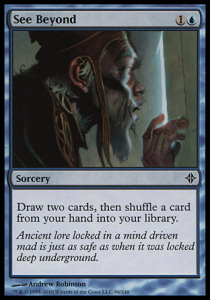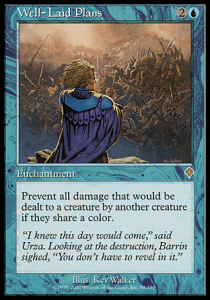When last we met, I posed the question, “Why do Bad Things happen to Good Decks?” I ended without concluding—I didn’t say why bad things happen to good decks. I did, however, mention luck. Luck seems to be the most common reason conjured to explain why good decks underperform, less ‘skilled’ players overperform, and spellslingers suffer from mana screw or flood. I’d like to expand on luck and how it can be deceptive.
Let’s talk about The Resistance: Avalon.
What? A game that’s not Magic?
Bear with me, friends. Not only are there fun games besides Magic, but playing them can teach us to be better Magic players. Avalon is certainly one such game.
The Resistance: Avalon is a social deduction game—you play with a group of people, there are at least two teams, and you must learn who you can trust in order to win the game with your team. Mafia and Werewolf are two of the most famous such games, but there are many others (including The Resistance and it’s modification, Avalon). Here’s how Avalon works:
Before the Game Begins
- At the beginning of the game, each player is dealt a random role card. Only you may look at your role card.
- Your role card tells you which team you’re playing for (good or evil). There are always more good roles than evil, but evil roles have more powers.
- In Avalon, information is power. Several roles have special powers that provide them with information about other players in the game (this will be explained in more detail in a bit).
- When the game begins, you are allowed to say whatever you want (yes, you may and often should lie) but you cannot reveal your role card.
During the Game
- The game consists of five missions.
- Each mission, all players nominate a small team of players to participate in the mission. All players vote publicly for or against these teams. Once a majority votes in favor, the team passes and all players on it go participate in the mission. (There’re more rules to nomination procedure, but I won’t go into that in this article.)
- The missions are simple: each player on the team secretly votes for the mission to fail or succeed. Good roles can only vote for success; evil roles can vote for either success or failure. If there is a single vote for failure, then (most of the time) the mission fails. Players know how many votes for success/failure were on a mission, but not who voted for what.
- There are five missions, so the first team to win three missions wins the game.
- If the evil team wins, then the game is over. If the good team wins, then the evil roles reveal themselves to have one final chance at victory. If they can identify the player with the role of Merlin, they win anyway!
We’re almost back to Magic. Thanks for your patience, if you’re bearing with me, and if you’re excited to hear more, then great—I love this game!
Avalon can accommodate different numbers of players with different combinations of rules and variants. I tend to participate in ten player games with the following roles.
Evil Roles
- Morded—You know who your fellow evil players are. None of the good roles (including Merlin) knows anything about you.
- Morgana—You know who your fellow evil players are. One of the good roles (Percival) knows something about you.
- Evil Lancelot—You know who your fellow evil players are. One of the good roles (Guinevere) knows something about you.
- Oberon—You do not know who your fellow evil players are, nor do they know who you are. You are a chaotic enigma.
Good Roles
- Merlin—You are the most powerful character in the game. You know that the players with the roles of Morgana, Evil Lancelot, and Oberon are evil (though you don’t know who has which role). At the end of the game, if good wins, the evil team will attempt to assassinate you, and if they do, they win and good loses. You cannot reveal yourself!
- Loyal Servant of Arthur (x2)—You know nothing, except that you are good.
- Good Lancelot—You know nothing, but Guinevere knows something about you.
- Percival—You know which players have the roles Merlin and Morgana, but you do not know who has which.
- Guinevere—You know which players have the roles Evil Lancelot and Good Lancelot, but you do not know who has which.
The Lady of the Lake
- The Lady of the Lake is a special card randomly assigned to a player in addition to their role card.
- At the beginning of the third mission, the holder of The Lady of the Lake passes the card to another player. The player who receives The Lady of the Lake must honestly reveal which team they’re on to the person who gave them The Lady. The original holder of The Lady may then say whatever they like about the other person’s alignment.
- This process is repeated in the fourth and fifth missions, which the new holders of The Lady of the Lake passing The Lady to someone new.
With the roles out of the way, let’s get down to business. In one of my first games of Avalon, I had the role of Evil Lancelot and started the game with The Lady of the Lake. At the beginning of the third mission, I checked someone, saw that they were good, and said that they were good. The table quickly turned on me, outing me as evil. I had no idea why.
As it turned out, I’d checked the alignment of Good Lancelot. Another player, Guinevere, knows who both Good Lancelot and Evil Lancelot are. If Good Lancelot had checked Evil Lancelot, he’d have said the checked person was evil (good players have little to no incentive to lie in Avalon [except when it comes to Merlin]). Therefore, one Lancelot checking another and saying that the other is good confirms to Guinevere which Lancelot is which (Evil Lancelot gave The Lady to Good Lancelot). I, and several players who explained this to me, chalked it up to bad luck. After all, there were nine players I could have chosen to Lady and I’d happen to choose the only person who’d screw me over. The odds were just over 10%. It was just bad luck.
When I sat down to think about it, I realized that there was much more nuance to my decision than I gave it credit for. After all, I knew two of the other players were evil (I didn’t know who Oberon was) and I chose not to Lady them. That increased my chances of giving The Lady to Good Lancelot from 1/9 to 1/7. Furthermore, if I were to give The Lady to Guinevere, she would then be able to check the other Lancelot in the following mission and the jig would be up. Turns out, the odds of my blowing my cover were 2/7—almost 30%. A 70% chance of not revealing my identity isn’t bad odds, but it’s certainly not a certainty.
I hadn’t even given thought to lying: if I gave The Lady to Good Lancelot and called him evil, I’d appear to Guinevere as Good Lancelot, which would be great for my team! Sure, if I did that to Guinevere, I’d be caught, but that strategy would only have a 1/7 chance of failure (which is twice as good as my “don’t lie when you see good” strategy). Also, what if, in using The Lady, I found Oberon? Should I still be truthful and try to gain their trust? I hadn’t anticipated that option. Additionally, I could have knowingly given the Lady to one of my teammates, keeping me safe from accidentally finding Good Lancelot or Guinevere. Both of these options were superior to giving The Lady to someone I didn’t know and being honest about their alignment.
It turns out that what appeared to be misfortune was in fact my not understanding the game. Once I looked for an explanation other than bad luck, I discovered the intricacies of the game and how with more strategy, I could have played better. With that in mind, let’s return to Magic.
Mana screw, color screw, and mana flood are common pitfalls of Magic. They’re obvious instances of bad luck. Think about how often players will flood out/be screwed, throw their hands up in the air, and walk away from the table not thinking they could have done anything differently. I believe that they’re often wrong—they could have done something and weren’t merely victims of misfortune.
Consider Khans of Tarkir Limited. It’s a format that’s high on power, high on color commitment, and high on mana requirements. Most of the time, you’ll want to consistently be able to play Abzan Guide (or any morph creature) face down on turn three and unmorph it on turn five. This means that by turn five, using only the top eleven or twelve cards of your library (depending on whether you’re on the play or the draw), you’ll need to hit all five land drops and find three different colors of mana. Furthermore, you cannot play an ETB tapped land on turns three or five (though you could play the morph on turn four, that’s a lot worse). That’s a lot that you need to have happen, and all to make one single spell work.
Khans of Tarkir requires substantial attention be paid to mana when deckbuilding and mulliganing. If you’re not careful, you’ll fail to hit your crucial land drops and find your colors early. In many other Limited formats, a two land, five spell hand on the draw is often an easy and strong keep; in Khans, it means you’re unlikely to hit your crucial fifth land, be unable to unmorph your creatures on time, and run the risk of not having all of your colors.
My conclusion to “Why do Bad Things happen to Good Decks?” shouldn’t surprising: my “good” Abzan deck underperformed because it wasn’t as good as I thought it was, not (merely) because of bad luck. Its mana base wasn’t solid and its cards (particularly its threats) weren’t as strong or numerous as I needed them to be. Similarly, my “bad” multicolor morph deck didn’t merely run well. I ran extra lands to bolster its need for many colors and to hit land drops. Many of its creatures were powerful threats in and of themselves, could exist at various parts of the curve thanks to morph, and benefitted from the addition of a fourth color (the more colors and morph cards you play, the more possible creatures you can unmorph, and the greater amount of mistakes your opponents make when guessing their identity). It felt like luck, but I’d like to believe that something was learned from both the unfortunate Abzan and the happy multicolor mistake, and that my outcomes were more heavily influenced by drafting, deckbuilding, and mulliganing that I thought.
Think back to your last frustrating loss. Was it really out of your control? Did you really not make any mistakes? Could you have planned for this situation beforehand, either when drafting, deckbuilding, or mulliganing? Is there some part of the loss that you claim ownership over? I believe that it’s likely you can.
I welcome your comments and am happy to discuss anything here in depth. I invite and encourage everyone to try out new games (if only to prepare for next year’s Magic board game or to step up your Magic prowess). And, as always, thanks for reading.
—Zachary Barash
Zachary Barash has been playing Magic on and off since 1994. He loves Limited and drafts every available format (including several that aren’t entirely meant to be drafted). He’s a proud Cube owner and improviser, creating entire musicals from scratch every week. Zach has an obsession with Indian food that borders on being unhealthy.



